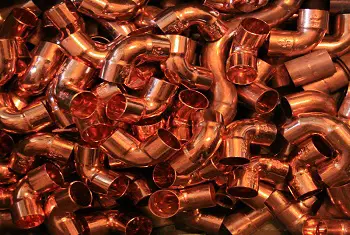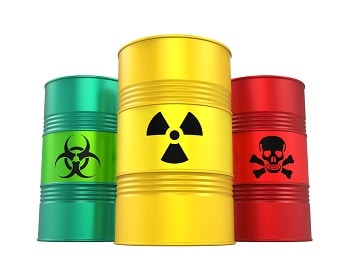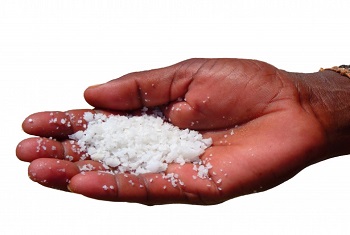Looking forward to a nice refreshing drink of water, you put your glass to your lips for a sip and BLAH! It tastes like you just swallowed a glass full of old pennies. What could be making your water taste like it has metal in it, it might actually be metal!
Why Does My Water Taste Like Metal? Water tasting like it contains metal is often due to corrosion of metal plumbing from acidic water, electrolysis, Chlorine, high levels of total dissolved solids in the water, or simply age. Particles of the metal plumbing get dissolved in the water and can be tasted when consumed.
Since several causes can create the same basic result, let’s break down the causes and explain how they come about and what you can do to remedy them.
What can cause your water to taste like metal, and why!

If you’ve ever drunk acidic water from a metal container or had a metal filling put into one of your teeth, you know what a metallic taste in your mouth tastes like. The reason that you taste the metal is that the acid in your mouth breaks down metal.
That’s why anytime that metal is exposed to water and there is corrosion of the metal, you may have a metal taste. And here are the most likely causes of that taste.
Is your metal plumbing brand new?
We like to think of new things as being clean and pure, well that’s exactly what brand new metal plumbing is, and why it can give the water running through it a metallic taste.
This taste will often go away after a short time as minerals in the water will create a thin layer on the walls of the piping preventing the metallic taste from being absorbed into the water.
The acid in your water may be corroding your pipes!

This is probably the most common reason that water may have a metallic taste to it. Acidic water is very common and when it is exposed to metal plumbing, it will corrode the metal and particles of the metal will end up in the water.
Acidic water can be much more than just an inconvenience. A metallic taste in your water due to acidic water may be just the first sign that your plumbing is corroding which may lead to the walls of the pipes wearing down and eventually bursting.
Also, acidic water can have a sourish metallic taste even if there is no metal in it at all. Our taste buds often can’t distinguish between a sour acidic taste and a metallic taste.
Acidic water can usually be treated using an acid-neutralizing filter which will make your water neutral and therefore, non-corrosive to the plumbing of your home.
Improper grounding of your home’s plumbing can cause electrolysis.
This is when a metal pipe makes contact with an electrical charge, but is not able to discharge to ground.
Electrical appliances, water heaters, and other items in your home that use electricity often need to be grounded. This is very commonly done by simply attaching the ground wire to the plumbing of your home which is supposed to be grounded.
If the plumbing has been altered in any way, the ground may no longer exist, or is no longer making contact with all of the plumbing of your home.
Using plastic piping or even just repairing a leaking pipe with a connector that breaks the ground connection can cause the pipes to build-up a charge.
This electrical charge can react with the metal plumbing causing it to corrode and particles of the plumbing end up in the water that you drink. And therefore a metal taste can occur.
Chlorine disinfects your water, but it can also corrode your metal pipes.
Municipal water suppliers will chlorinate water being supplied to residential areas. Normally the level of chlorine is just enough to sanitize the water which requires a relatively low level of chlorine.
But sometimes a municipal water treatment company will greatly over chlorinate their water due to contamination concerns or simply because of the large volume of water that needs to be treated.
This may sound like a good thing, but if you are close to the water treatment facility, the level of the chlorine can be quite high.
Not only does a high level of chlorine in your water make your home smell like a swimming pool, but it can bleach your clothes, ruin your hair, make you sick, and even corrode your pipes which can make your already unappetizing water taste like metal.
But what can I do about the chlorine in my water?
The first thing to do is report it to the water treatment company that treats your water. Sometimes a high dose of chlorine is very temporary or even by accident.
You can easily test the amount of chlorine in your water with a simple chlorine testing kit.
The chlorine system that introduces the chlorine into the water may have malfunctioned as they sometimes do. This can make the system feed way more chlorine than it is intended to.
Most chlorine systems are little more than mechanical pumps that have check balls and seals in them that can stick or not seal correctly, making the chlorine dose too high or even not at all.
Also, many water treatment companies will over chlorinate the water just as a precaution. They often feel that a little extra chlorine is better than a little less.
Excessive sodium in your water can eat away at your pipes, just like salt can eat away at your car.

Although not very common, water from wells containing very high levels of salt can cause the homes plumbing to deteriorate, just as road salt is well known to eat away at a car’s paint and metal.
This corrosion by excessive salt will breakdown the metal and the water will absorb particles of metal from the pipes making the water not only very salty but also have a metallic after taste to it.
Maybe your plumbing has seen better days!
Materials used for the plumbing of a home have changed very much over the years. Metals like brass, copper or galvanized steel which have been used for a long time, have an optimal life of between eighty and one hundred years. Source

As the metal plumbing in your home ages, it breaks down and becomes more susceptible to corrosion.
Older pipes may become etched or worn due to debris or minerals running through them over the years. This can cause the metal to more easily be absorbed into your water and could lead to metallic tasting water.
Reverse osmosis water is normally acidic and could taste metallic from a non-reverse osmosis faucet.
See my article on Does Reverse Osmosis Change Water pH
A water faucet that is designed for use with a reverse osmosis drinking water system is designed to meet standards set by the Federal Safe Drinking Water Act. Source
What this means to the average consumer is that the reverse osmosis water that will be traveling through the faucet will not react with the material that the faucet is made to create any harmful health issues.
But non-reverse osmosis approved water faucet may have metals that will react with the reverse osmosis water that could be harmful or create a metal type taste in the water.
The reason for this is that the process of reverse osmosis removes minerals in water which neutralizes the acid in it. Once these minerals are removed, the acidic and very pure water becomes aggressive which will make it absorb new minerals more easily.
Some medications can react with reverse osmosis water, giving it a metallic taste.
When taking certain medications, the body can go through some substantial changes including a change in how you perceive taste. This condition is known as dysgeusia and can make even everyday things taste different than they should. Source
Common medications taken for conditions like infections, diabetes or during pregnancy can cause patients to experience changes in the way things taste, including water. Patients often complain about their water tasting metallic, sour and even bitter.
Changing medications can often reduce these changes in how water tastes, but when taking medications, it is not uncommon for these side effects to happen.
What you can do when your water tastes like metal.
Let’s get your water tested so we can find out which of these situations is the most likely culprit to your metal tasting water.
Simple testing of your water can often help identify why your water has a metallic taste to it. Low pH, high TDS and hard minerals in your water can damage pipes and cause the metal to corrode which can lead to metallic tasting water.
Most causes of metallic tastes in water are not harmful, just unpleasant. But certain metals like lead can make your water unhealthy to drink and should be removed by the use of reverse osmosis in order to make the water drinkable.
Even though the use of lead solder was made illegal in 1986 because of health concerns, some homes may still have plumbing with lead solder. Ideally, this plumbing should be removed and replaced with a less harmful material.


I have new metal pipes and the water tastes not good. How long does it generally take to get the taste out and back to normal? Is there anything I can do to speed the process up? My pipes are about 2 weeks old. Thank you
Hello LB and thank you for the question.
New metal plumbing will often cause an odd taste in your water due to the soldering that connects the pipes. This will usually go away after a few weeks as the solder flux rinses away.
I hope that this was helpful.
Paul